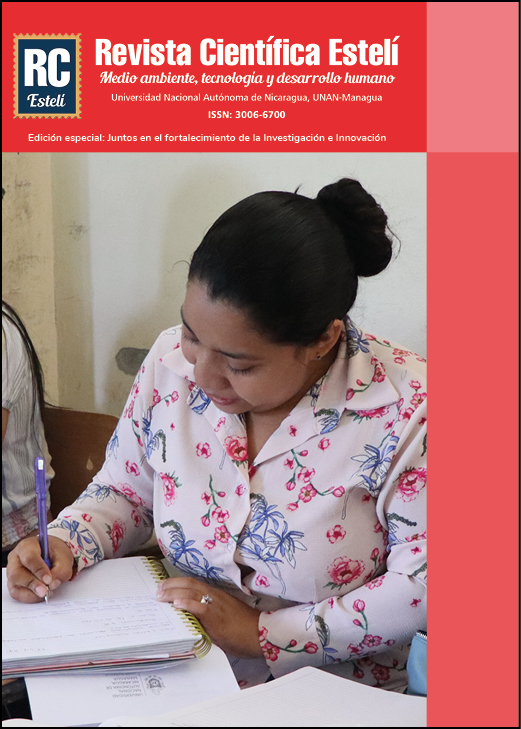Organizational proposal of the Ecomuseo Vivo as a tourism development alternative for the social participation of the territories of the UNESCO Global Geopark Río Coco Madriz, Nicaragua
DOI:
https://doi.org/10.5377/esteli.v13i2.19805Keywords:
Sustainable development, social participation, tourism, heritage, EcomuseumAbstract
This article presents an organizational proposal of the Ecomuseo Vivo as a tourism development alternative for the social participation of the territories declared UNESCO World Geopark Rio Coco Madriz, Nicaragua. A descriptive study with a cross-sectional qualitative approach was developed. The study area consisted of five communities: Totogalpa, Somoto, San Lucas, Las Sábanas and San José de Cusmapa. Observation guides, surveys and interviews were applied, and 39 key actors of the tourism activity participated in the workshops. In this space, the favorable impact of the Ecomuseums was reflected upon and how this organizational proposal contributes to the sustainability of the aforementioned category, taking into account two factors, one oriented towards heritage education, and the other oriented towards cultural, social and economic growth in the communities. The main findings show how the characteristics that were identified in the natural heritage of the Geopark determine its meaning and relevance for the territory, from its scientific, cultural, educational value because it provides unique information about the past, present and future of the planet. In addition, the organizational proposal to create Living Eco-museums as an alternative to tourism development is important for several reasons: Living Eco-museums aim to preserve and enhance the cultural and natural heritage of a given region, actively involve the community in all stages of the process, from planning to implementation and management of the project. This promotes community ownership of their heritage and their voices, knowledge and traditions are recognized and valued. Community participation also fosters pride and a sense of belonging, strengthens social structures, and enlivens collaboration among diverse local stakeholders, which in conclusion is the main purpose and sentiment for maintaining the aforementioned status.
Downloads
References
Alvarado, R. (2020). ICOM: Armonía entre patrimonio, educación y desarrollo,. Más museos. Revista Digital, 2.
Álvarez, C. A. (2011). Obtenido de Metodología de la investigación cuantitativa y cualitativa. Guía didáctica: https://www.uv.mx/rmipe/files/2017/02/Guia-didactica-metodologia-de-la-investigacion.pdf
Copano, L. M. (2017). Instituto para el Desarrollo Social Sostenible ecomuseo-3. Obtenido de https://indess.uca.es/wp-content/uploads/2019/05/Instituto-para-el-Desarrollo-Social-Sostenible-ecomuseo-3.pdf?u
El 19 Digital. (20 de julio de 2020). El Río Coco se convierte en el primer Geoparque de América Central declarado por la Unesco. Obtenido de https://www.unesco.org.ni/geoparque-rio-coco/
Espinoza, S. (1 de julio de 2021). unan.edu.ni. Obtenido de Gobierno de Nicaragua presenta Plan Nacional de Lucha contra la Pobreza 2022-2026: https://www.unan.edu.ni/index.php/relevantes/gobierno-de-nicaragua-presenta-plan-nacional-de-lucha-contra-la-pobreza-2022-2026.odp
Eve. (20 de Septiembre de 2023). Nueva Museografia. Participación y Transformacion Cultural. Obtenido de https://evemuseografia.com/2023/09/20/nueva-museologia-participacion-y-transformacion-cultural/
Eve, M. (10 de febreo de 2023). Obtenido de Ecomsueo y sus principios básico : https://evemuseografia.com/2023/02/10/ecomuseos-y-sus-principios-basicos/
Fernández, F. J., Pablo, A. G., & Navajas, C. O. (13 de febreo de 2014). La Ponte-Ecomuséu: una herramienta de desarrollo rural basada en la socialización del patrimonio cultural. Recuperado el 24 de julio de 2024, de https://digital.csic.es/handle/10261/126385
Gambarota, D. M., & Lorda, M. A. (2017). Revista venezolana . Recuperado el 7 de julio de 2024, de https://www.redalyc.org/jatsRepo/3477/347753793006/html/index.html
ICOMOS. (1999). Obtenido de Carta Internacional sobre Turismo Cultural. La Gestión del Turismo en los sitios con Patrimonio Significativo (1999): https://icomos.es/wp-content/uploads/2020/01/tourism_sp.pdf
Moreno, L. A., & Álvarez, A. M. (2024). El Ecomuseo: una ventana al pasado y un impulsor del desarrollo sostenible. Revista científica Esteli(49), 24-41. doi:https://doi.org/10.5377/esteli.v13i49.1788
Moreno, L. A., & Álvarez, A. M. (2024). El Ecomuseo: una ventana al pasado y un impulsor del desarrollo sostenible. (C.-E. UNAN-Managua, Ed.) Revista Cientifica Estelí, 13(49), 24-41. Recuperado el 30 de julio de 2024, de El Ecomuseo: una ventana al pasado y un impulsor del desarrollo sostenible: https://revistas.unan.edu.ni/index.php/Cientifica/article/view/3823
Naciones Unidas. (2018). Obtenido de La Agenda 2030 y los Objetivos de Desarrollo Sostenible: una oportunidad para América Latina y el Caribe (LC/G.2681-P/Rev.3), Santiago.: https://repositorio.cepal.org/server/api/core/bitstreams/cb30a4de-7d87-4e79-8e7a-ad5279038718/content
Ortega, H. R., & Gutiérrez, C. R. (2019). Gobernanza para el desarrollo sustentable del turismo en la Patagonia Chilena desde la macrovisión de los planes maestros a la focalización en las zonas de interés turistico. (C. d. Turísticos, Ed.) Estudios y Perspectivas en Turismo, 29(4), 1232-1254. Obtenido de GOBERNANZA PARA EL DESARROLLO SUSTENTABLE DEL TURISMO EN LA PATAGONIA CHILENA Desde la macro visión de los planes maestros a la focalización en las zonas de interés turístico.
Pasková, M. (2015). El potencial del conocimiento indígena para el geoturismo del Geoparque Río Coco. ScienceDirect, 15, 886-891. Obtenido de https://www.sciencedirect.com/science/article/pii/S187852201500404X?via%3Dihub
Sánchez-Vidal, A. (2020). Obtenido de Psicología comunitaria. Definición y bases teóricas: Comunidad, Desarrollo Humano y empoderamiento: https://www.researchgate.net/profile/Alipio-Sanchez-Vidal/publication/344648969_PSICOLOGIA_COMUNITARIA_DEFINICION_Y_BASES_TEORICAS_COMUNIDAD_DESARROLLO_HUMANO_Y_EMPODERAMIENTO_Alipio_Sanchez_Vidal_Univer
Silva, C., & Martínez, M. L. (2004). Empoderamiento: Proceso, Nivel y Contexto. Psykhe, 13(1), 29-39. Obtenido de https://www.scielo.cl/scielo.php?script=sci_arttext&pid=S0718-22282004000200003
Strauss, A., & Corbin, J. (2016). Obtenido de Bases de la fundamentación científica : https://www.google.com.ni/books/edition/Bases_de_la_investigaci%C3%B3n_cualitativa/0
UNESCO. (1985). Imagenes del ecomuseo . Obtenido de Biblioteca digital : https://unesdoc.unesco.org/ark:/48223/pf0000127347_spa
UNESCO. (2012). Guia fácil 1 cultura y nuestros derechos culturales. Recuperado el 14 de agosto de 2024, de UNESCO: https://unesdoc.unesco.org/ark:/48223/pf0000228345
UNESCO. (2016). Obtenido de El Museo y el patrimonio cultural inmaterial: https://unesdoc.unesco.org/ark:/48223/pf0000135864_spa
UNESCO. (7 de julio de 2020). Obtenido de Geoparque Río Coco: https://www.unesco.org.ni/geoparque-rio-coco/
UNESCO. (2024). International Geosciencie and Geoparks Programme. Recuperado el 2 de junio de 2024, de Los Geoparques Mundiales de la UNESCO: https://www.unesco.org/es/iggp/geoparks/about
Zorrila, A. (2020). Identidad y desarrollo el valor del ser. Obtenido de Análisis del espacio turístico regional para el desarrollo sostenible: https://identidadydesarrollo.com/analisis-del-espacio-turistico-regional/
Downloads
Published
Issue
Section
License
Copyright (c) 2024 Revista Científica Estelí

This work is licensed under a Creative Commons Attribution-NonCommercial-ShareAlike 4.0 International License.

